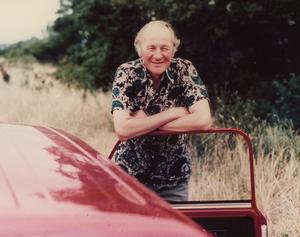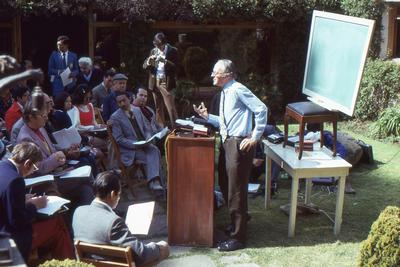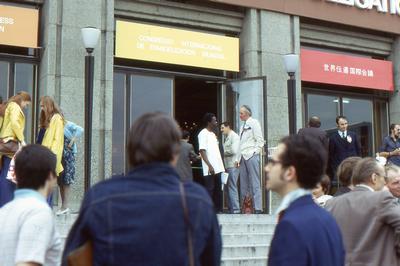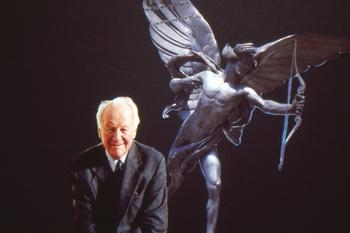From Richard Bewes, for Anglican-Mainstream.net
‘A messenger of the church and the glory of Christ’
JOHN R.W. STOTT
Richard Bewes writes about the Founder of The Church of England Evangelical Council, and the Evangelical fellowship in the Anglican Communion
John Robert Walmsley Stott, born on April 27th, 1921, was called to rest on July 27th, 2011, after a lifetime of church leadership, Bible teaching, evangelism and writing – stretching across a canvas that covered every continent. In the minds of thousands of pastors and students of Scripture worldwide, he has been the unofficial holder of the Blue Riband in Bible exposition.As one theological college Principal

JRWS on safari. (Photo: Richard Bewes)
commented to me, “When called upon to expound a Scripture passage, I would refrain from consulting John’s published comments too early, because no sooner had I read them than it seemed there was simply nothing left to explain!” When embarking upon his commentary on the letter to the Romans, it is no exaggeration to state that John Stott read every major work available – including all fourteen volumes of Dr Martyn Lloyd-Jones’ influential expositions.
I remember – when serving along with Michael Lawson on the ministry team at All Souls Church - that we invited John to bring us a sermon series on the message of the Cross. We knew, when the series was over, that a book would be coming. Many were the reviewers who would eventually acclaim The Cross of Christ as the greatest in a long convoy of books from John Stott, many of which will still be read in a hundred years’ time – in scores of languages. It is indeed these 50 books and more

A signing session at All Souls (Photo: Richard Bewes)
– written across a whole lifetime - that will provide his most enduring legacy to the church worldwide.
And what of the Church of England Evangelical Council – and the Evangelical Fellowship in the Anglican Communion (EFAC) - of which CEEC was the mother body? It was in the early sixties that John’sleadership was to enter a fresh dimension in the creation of these organs of evangelical unity and support among anglicans, and not least in the encouragement and continuing development of diocesan evangelical fellowships. Books and conferences would stem from CEEC, Of special note would be the series of periodic National Evangelical Anglican Conferences (NEAC).
Overseas, the formation of EFAC was launched in a number of countries; this again for the strengthening of evangelical ties in country after country. In addition the EFAC Bursary scheme came into being - by which overseas pastors could be brought over to the United Kingdom for parish experience and study. This later was to lead to the development of The Langham Trust scholarship scheme, whose aim was to bring leaders to the UK for doctoral research.
Many of these overseas leaders were to rise to positions of spiritual leadership when they returned to their countries. Thus it was no great

surprise that around Asia, Africa, the Far East and in parts of South America, numbers of emerging bishops and theological teachers were evangelical in outlook. This was strategic for the future of world Anglicanism which – today – is between seventy and eighty percent evangelical in its leadership.
Later would come the creation of The London Institute for Contemporary Christianity and later still, The Langham Partnership, one ofthe aims of which was the strengthening of biblical preaching around the world. As John’s travelling began to lessen after the turn of the century, he handed over the leadership of this work to Dr Chris Wright. It continues today.
And then there was Billy. Ever since Dr. Graham’s three-month nightly programme of tireless preaching in London’s Harringay Arena in 1954, a bond was to be forged between what Rick Warren of the USA today describes as Evangelicalism’s global ‘Preacher’ and ‘Theologian.’ This twinning of souls was first marked through the Lausanne movement, the launching of which took place at the great congress of 1974. Steadily, a network of truth and trust was being woven across all five continents among Bible believers by these two great leaders.

John greets friends at Lausanne (Photo: Richard Bewes)
Authenticity and integrity together formed the touch-stone in John’s biblical ministry. Whether writing or preaching, he would never quote from any author whose book he had not personally read. Naturally, with such a rigorous commitment, it was felt necessary to recruit to his side a succession of ‘study assistants’ over the years - whose responsibility it was to visit libraries on his behalf, read manuscripts, check proofs, escort him to speaking engagements – and to give support in a host of practical ways.
And then there was Accountability! This openness to another's spirit lay behind John Stott’s formation of what he called his Accountability Group of Elders (‘AGE’) in the 1980’s. Perhaps not enough Christian leaders do this – to submit outside invitations and dreams, achievements and disappointments, to the prayerful assessment and judgement of others. I would chair John’s small group of about eight or ten trusted colleagues and friends, and think to myself, John is exemplifying before us all yet another standard required of the Christian leader.
John Stott has seemed to thousands of us to follow in the same tradition as that set by the great evangelical of the eighteenth century, Ashley Cooper, seventh Earl of Shaftesbury - in whose memory the statue of Eros was erected in the heart of London. Or – further back still – in that set by Titus and the other ‘brothers’ of the New Testament, hailed by the grateful apostle Paul as messengers of the churches and the glory of Christ (2 Corinthians 8:23 KJV).
To God be the glory for all that John Stott’s life and Christ-centred ministry has represented.

--ooOoo--
